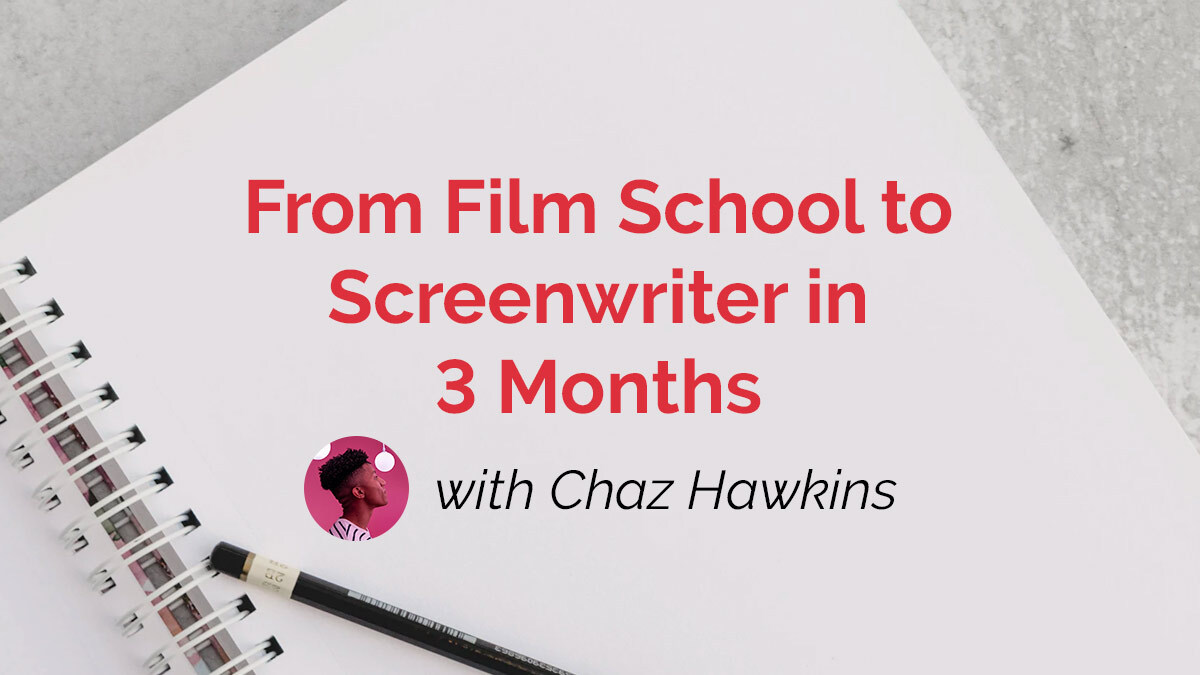
Recently we had a chance to chat with screenwriter, Chaz Hawkins who is hot off his recent signing with manager, Aaron Lipsett at Heroes & Villains Entertainment just three months after graduating from film school. Learn how Chaz's broke into the screenwriting industry and sold two of his scripts during a pandemic just a few months into his career.
 Coverfly: What were some of the biggest obstacles to your screenwriting career goals when you started out?
Coverfly: What were some of the biggest obstacles to your screenwriting career goals when you started out?
Chaz Hawkins: Timing.
I came into this industry during a strange time. A pandemic confined people to their homes while a civil rights movement beckoned us to the streets. And the economy took another “once-in-a-lifetime” downturn. At twenty-five, I have lived through, not one, not two, but three “once-in-a-lifetime” economic downturns.
I’m starting to doubt the education of people who repeat the phrase “once in a lifetime.” But I’ve realized now, there’s great humanity in this chaos.
CF: What are some of your biggest challenges and accomplishments in your young screenwriting career so far?
Definitely selling my first two screenplays THE SAUCE and PLIMOTH. It’s crazy graduating from Loyola Marymount University in May into a pandemic and being told, “Hey! Things are wild. Don’t expect much.” Then…BAM! I sold THE SAUCE in my first general ever. Literally, day one ended in a handshake. Blew my mind.
My greatest challenge at the moment is keeping up! My time management has become more crucial than ever as I juggle both projects in development while writing and devising my next three.
CF: What were you hoping to gain from Coverfly when you first signed up for the platform?
When I joined Coverfly, I sought to get in front of as many eyes as possible. Cast a wide net and all that in hopes that just one pair might see something in my stories. Like every other emerging artist in this biz, I wanted that first job. No one's going to give you that first industry co-sign, but everyone wants you to have it. So you have to buckle down, hustle, and take it. The pandemic forced me to get craftier, and Coverfly increased my visibility while Hollywood was “shut down.”
CF: What was it like to sign with a manager and then option two screenplays in the span of three months.
It’s been odd. It’s like being in a state of suspended animation. Heroes and Villains manager, Aaron Lipsett signed me in June. Together we decided to use my horror feature THE SAUCE as my introduction to the greater entertainment industry. It made sense. It speaks to a lot of what’s going on outside our windows. The protests, the unfairness, the indecency. Some people just got too caught up in being Democratic or Republican that they forgot how to be human. THE SAUCE puts a fun but incisive lens on that.
I came into that first general (my first ever general) with Scott Free a bit nervous. But after a spirited pitch, I left with my first handshake. It was an incredible feeling. THE SAUCE was also the first feature I’d written after my father passed in October of 2018, and, miraculously, I got to trust it to Scott Free who made my father’s favorite movie of all time, GLADIATOR. In a way, they’ll be able to immortalize him with something I wrote, but that was just meeting number one after graduating merely a month and a half before. Talk about a high bar!
From then on, I was in my element Zooming from room to room, person to person, doing the water bottle tour from the comfort of my own apartment, which presents a unique advantage. Now, I can meet tons of amazing people in one day instead of driving all over town. That helped “keep the hot plate cooking.” That’s what we’d say in my mother’s house, at least.
PLIMOTH found a foothold with Creator Media (the John Wick Franchise!) which was a different experience. PLIMOTH was a passion project on the other end of the spectrum to THE SAUCE. A Turkey Day horror affair where Vampire Pilgrims invade the New World in search of Squanto.
I knew that, once THE SAUCE was off my hands, PLIMOTH was up next because I wanted to use my voice to push the needle forward for both of my identities — the American Black and Cherokee. So I started pitching it more fervently as my “leave behind.” After a great general with Creator Media, they fell in love with it.
I know that all sounds kind of epic and crazy, but, like, nobody pinch me. Please.
CF: What's next for your writing career? What are your short term and long term goals?
Right now, I want to focus on making THE SAUCE and PLIMOTH the best that they can be. So I’m devoting the majority of my bandwidth to their continued development. For my next move, I’ll be sitting in the director’s chair organizing a fun, high-octane, horror feature I’m developing with my team, FIGHT NIGHT.
I’m, also, developing a one-hour grounded sci-fi/western pilot, which will blend Cherokee myth with the Native expulsions of 1839, THE BIRD, THE BARD, AND THE BEETLE. Long term, I’ll build and run my own production company, so that I can open doors for others. It’s more fun to play this game when everyone can.
CF: What's a common misconception among aspiring screenwriters?
That one day your work will be perfect. Don’t get me wrong. Never take a crap step forward, but, at some point, we have to take a step. Waiting for that “perfect” draft is time wasted. There will always be other voices with opinions, so be happy with your work. Defend it, but always expect someone somewhere to find a flaw. It is up to you to decide whether you fix that flaw or not.
CF: If you could give aspiring writers one bit of advice from a craft standpoint, what would it be?
Pay attention. I know it’s hard to sit right now because of the madness happening everywhere. I don’t care about your politics, but this moment is beckoning us all to pay attention, listen, and recontextualize.
Emotions are so raw. My craft has benefitted from sharpening against it. Protesting, listening, and feeling allows me the opportunity to find strength in my own black and native experiences in America. Now, my craft uses that power to fight tooth and nail on the page too.
CF: If you could give aspiring writers one bit of advice from a career standpoint, what would it be?
Some writers come into the business with a diminished value on their worth to the greater Hollywood machine. It’s got a spotlight on it now, thanks to the WGA, but know your agency in these rooms. Writers provide the blueprint to which the rest of Hollywood stands, and they just want to meet us, talk about that crazy story we have, or brainstorm something together that’s even crazier because they want to build something with us that they cannot build by themselves.
If you enter that first room tentatively, all of the opportunities slowly slip until they’re snatched away from you like Anna Sophia Robb in BRIDGE TO TERABITHIA.
Start your screenwriting career
Sign up for your own Coverfly account to create a professional screenwriting profile that will kickstart your screenwriting career. Read more screenwriter success stories here to get the inspiration for your next project.